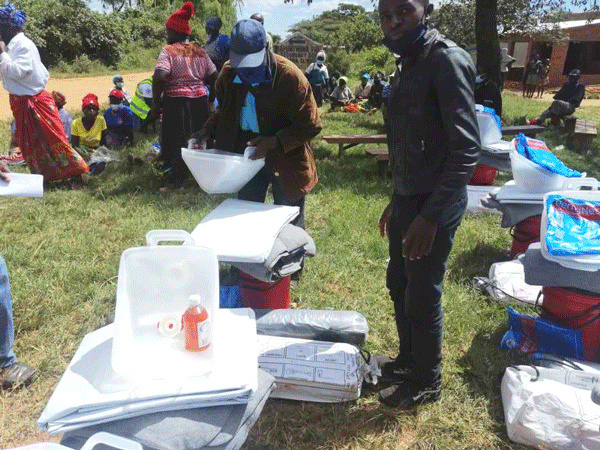
BY STYLE REPORTER
The Zimbabwe Red Cross Society (ZRCS) last week distributed relief items to survivors of Tropical Storm Eloise in Chipinge, Masvingo rural, Beitbridge rural and Chivi districts. A total of 400 households benefited from this International Federation of Red Cross and Red Crescent Societies (IFRC) — supported Disaster Relief Emergency Fund (Fund).
Of this support, ZRCS secretary-general Elias Hwenga said they were happy to be playing their part in supporting the Tropical Storm Eloise survivors.
“The Red Cross movement is there to alleviate human suffering wherever it is found and however it is caused and we are happy to be rolling out this IFRC — supported distribution of relief materials to survivors of Tropical Storm Eloise,” Hwenga said.
“This Disaster Relief Emergency Fund (DREF) is covering both food and non-food relief support and we are grateful for our partners for this support. The Red Cross movement is the first in and last one out of emergency situations and we are happy that this further support is coming to buttress our earlier interventions to the affected areas.”
According to ZRCS operations manager Tapiwa Chadoka, the distributions of relief materials which took place in Masvingo, Matabeleland South and Manicaland provinces follows earlier interventions by the organisation before the Dref funding came through.
“This week’s further support comes against the background of earlier support to the affected communities using locally available resources,” Chadoka said.
“As a humanitarian organisation, we are always on standby to assist victims of natural and man-made disasters and we are happy that the IFRC came through with further support.”
- Chamisa under fire over US$120K donation
- Mavhunga puts DeMbare into Chibuku quarterfinals
- Pension funds bet on Cabora Bassa oilfields
- Councils defy govt fire tender directive
Keep Reading
Tropical Storm Eloise landed in Zimbabwe on January 24 after predictions by weather experts.
While initially the tropical storm had potential to develop into a tropical cyclone owing to high temperatures and continuous moisture feed in the Indian Ocean, it did not get to that stage. After making landfall in Mozambique, Eloise lost its intensity and became a tropical storm.
However, the tropical storm caused widespread damage along its path, particularly in Manicaland, the southern parts of Masvingo and Matabeleland South provinces.
Localised rains also pounded adjacent provinces as a result of the residual effects of the tropical storm.
Chadoka told Standard Style that the organisation carried out some assessments that led to the application for further support from the IFRC.
“The Zimbabwe Red Cross Society with support from Partner National Societies immediately carried out Emergency Rapid Assessments to ascertain the extent of the humanitarian crisis resulting from the weather system,” he said.
“Indications from the assessments pointed out to great damage caused by flash flooding and wind storms. High velocity winds and rains resulted in rooftops being blown away, leaving households in urgent need of temporary shelter facilities.
“A funds mobilisation drive was immediately called for and IFRC approved the Zimbabwe Red Cross Society’s Disaster Relief Emergency Fund application amounting to 192,509 Swiss francs (US$203 737).
“The funds were set to benefit 400 households [2 000 people] in Chipinge, Masvingo Rural, Chivi and Beitbridge rural districts through provision of material support to the affected communities.”
Following the recent distributions, the affected households have received non-food Items to cater for their shelter and health and hygiene needs. The items include tarpaulins, blankets, mosquito nets, soap, face masks, buckets, jerry cans, sanitation and hygiene kits.
Food items support will also be provided to 275 households in Chipinge (130), Masvingo rural (95) and Beitbridge rural (50) districts. The ZRCS will follow up with a robust post-distribution monitoring exercise to ascertain the impact of the provided support.










